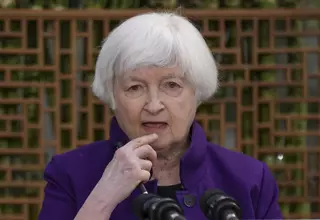Carbon Prices Too Low to Protect SE Asian Forests From Rubber Expansion: Report

Kuala Lumpur. The price of carbon credits must rise drastically if they are to help protect Southeast Asia's tropical forests against rubber plantation expansion, according to researchers.
Individuals, companies and countries purchase carbon credits to offset their greenhouse gas emissions.
Putting a cost on carbon emissions provides an incentive to do business more sustainably, and a disincentive to engage in environmentally damaging activities - like clearing forests.
But researchers found that credits bought and sold on international markets would need to rise from $5-$13 per ton of carbon dioxide to $30-$51 per ton if they are to safeguard Southeast Asian forests from rubber.
At current prices, carbon credits cannot compete with the profits to be made from felling forests and developing rubber plantations, according to the report published this month in the journal Nature Communications.
"We looked at rubber as an economic driver of deforestation," said Eleanor Warren-Thomas, the lead researcher who was at Britain's University of East Anglia when she worked on the study.
"What kind of profits can you make from rubber plantations, and what kind incentive [to preserve forests] do you need to provide through carbon finance?"
Such a large study has not been done before, she told the Thomson Reuters Foundation.
Most forest conservation efforts in the region tend to focus on palm oil expansion, and the growth of rubber plantations has received little attention, said Warren-Thomas.
Rubber demand rose over the last 20 years, as emerging markets like China and India became wealthier and more people were able to buy cars and motorcycles.
Rubber plantations cover about 11 million hectares around the world, two-thirds of which are in Southeast Asia, while annual expansion rates roughly doubled between 2003-2013, said Warren-Thomas.
Converting forests to rubber plantations results in net carbon emissions, as the carbon stored in the cut-down trees is released into the atmosphere - but that is not widely recognized in the industry, the researchers said.
"Rubber is [from] trees, and so it looks like you've replaced one kind of forest with another," said Tom Evans, an Oxford-based conservation director at the Wildlife Conservation Society, which was involved in the report.
"But really you've replaced a high carbon system that provides a lot of other ecosystems services with a much lower carbon ecosystem."
Zero-deforestation pledges made by governments and large tire companies, as well as the enforcement of forest protection laws, are crucial to curb rubber expansion, the report said.
Besides higher carbon credit prices, it also recommended further development of synthetic alternatives to natural rubber and improvements in recycling of natural rubber.
The researchers focused on forests in Cambodia, but those in China, Laos, Myanmar and Vietnam are also under threat from rubber, Warren-Thomas said.
Reuters
Tags: Keywords:POPULAR READS
Yellen Says Iran's Actions Could Cause Global 'Economic Spillovers'
Iran's missile attack on Israel early Sunday came in response to what it says was an Israeli strike on Iran's consulate in Syria.Prabowo Camp Cites ‘Procedural Error’ in Legal Challenge by Rival Candidates
The Constitutional Court's main task is to address alleged discrepancies in vote tallies, which neither of the plaintiffs challenged.Apple Wants to Increase Investments in Vietnam
Vietnam has become more important to Apple as the company seeks to diversify its supply chains away from China.China’s Top Diplomat Wang Yi to Visit Indonesia for Cooperation Talks
Chinese top diplomat Wang Yi will chair a policy coordination meeting aimed at strengthening Indonesia-China cooperation.President Jokowi Urges Global Restraint as Tensions Rise in the Middle East
President Joko "Jokowi" Widodo emphasized the importance of diplomatic efforts to prevent the escalation of conflict in the Middle EastPopular Tag
Most Popular






















